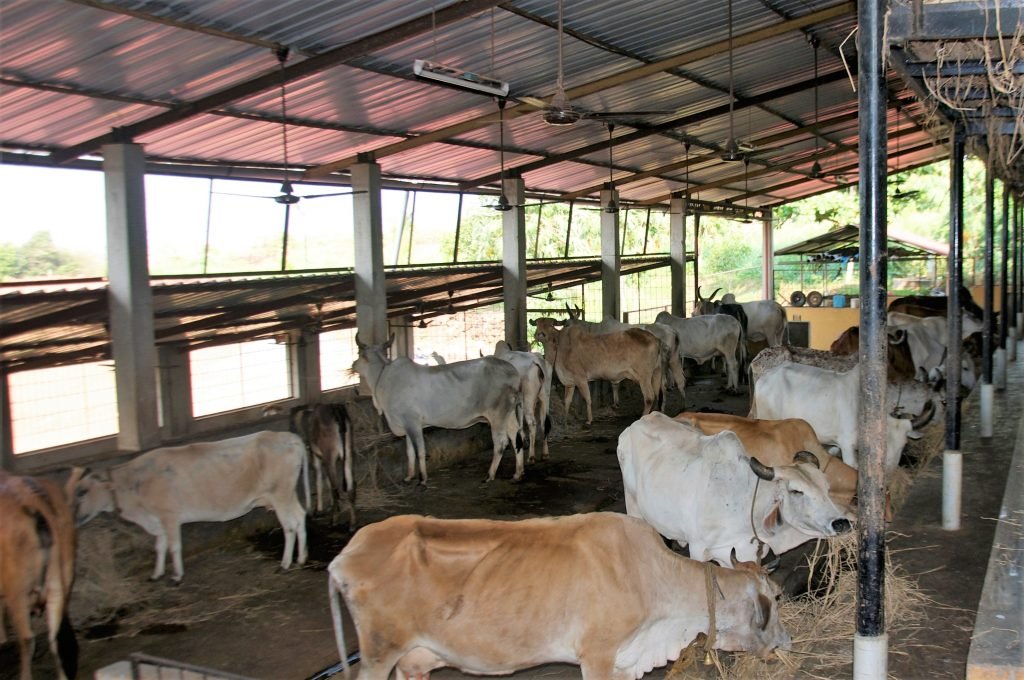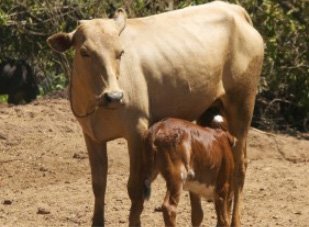Cross Breed Cows in India

About Cross Breed Cows
Crossbreed cows in India gained popularity during the last five decades. Milk production was not commercialized during earlier times and hence cow breeding was basically focused on male calves and improvement of their agricultural work capabilities. Only after 1970, an increased demand for milk, oriented dairy research towards higher milk production. This has led to cross-breeding of cows where pure Indian breeds of cows were inseminated with semen of the bulls of European Breeds. The European breeds belong to the Bos Taurus genealogy. All the Indian cow breeds belong to the genealogy Bos Indicus. In Europe, dairy farming was focused basically towards milk production for centuries primarily through cross-breeding.
Crossbreed cows in India were raised from good cow mothers, and good male calves born out of them. The male calves born to high yielding mothers were cared well and used for breeding. About 15-20 % of such breeding bulls really inherited the genes responsible for high milk production trait to their progeny. Such bulls are called proven sires. This approach of selection of breeding bulls helped to improve the milk yield to a greater extent. The repeated crossing of the new generation cows with the selected breeding bulls produces 99.9% high milk trait by around the seventh generation. The crossbreeding technique is accepted as the most suitable strategy for developing hybrid cows.
Crossbreed Cows in India
Among various dairy breeds of the world, Holstein Friesian (Popularly called as HF) and Jersey breeds have been identified as the most suitable for cross breeding. HF is with a black and white coat color and yields milk with 3 to 4 % fat. Jersey breed is red to chocolate brown in color and produces milk with 4 to 6% fat. The quantity of milk produced by Jersey breed is comparatively less than HF. The popular cross breed cows in India include:
- Jersey cross : Jersey crosses are produced by crossbreeding the chosen Indigenous breeds of cows with Jersey breed semen. Jersey crosses have been recommended as suitable dairy cows for tropical plains of India. These cows are medium sized, tolerant to heat compared to other exotic crosses and well adapted to Indian climate. They are resistant to tropical diseases as well. Depending on the indigenous breed used for crossing, milk production by Jersey crossbreeds is 3 to 4 fold higher than the original mother cow breed used for crossing. Jersey cross breed enjoys the status of the most popular crossbreed cows in India as its presence dominates even in the household and small dairy farms.
- Holstein Friesian cross : This is another cross breed cow in India. They are also developed similar to Jersey cross breed but using the semen from selected HF bulls. They are more accommodative to temperate climatic conditions and hence suitable for hilly regions. This breed is less tolerant to heat and more susceptible to tropical diseases than Jersey crossbreed. The milk yield is more but the fat content is less in HF crossbreed when compared to Jersey crossbreed.
Impact of Cross Breed Cows on Indian Dairy farming
Since the last few decades, the dairy farming in entire India is dominated by the crossbreed cows and is being promoted by the Govt. owned dairy departments through several attractive schemes to the farmers. This trend has resulted in serious setbacks leading marginalization of desi breeds of cows and even the wiping out of small breeds totally from the dairy farming and even individual households. Apart from this, we are forced to intake the A1 milk for years and generations.
Effect of this is now got exposed, as the increasing cases of diabetes, including juvenile diabetes, coronary heart diseases, etc. among us. Scientific research has provided strong evidence on this regard and society is realizing the bitter truth of late. But the policies of the dairy authority still favor the cross breed cows for farming. It is high time to bring a positive change in Dairy Farming through the promotion of conservation, breeding, and use of desi cow breeds producing A2 Milk in the dairy industry, which will definitely complement the healthcare sector on a colossal level in the years to come!
Help Us Now

Donate to Surabhivana Gaushala to save and protect Indian Cow Breeds.
All donations are exempt under Section 80G of the Income Tax Act, 1961. All donation receipts shall be mailed to the address given by the donor or may be collected in person, at request.
Click the below button to donate through credit cards/debit cards or Net Banking via Razor Pay.
